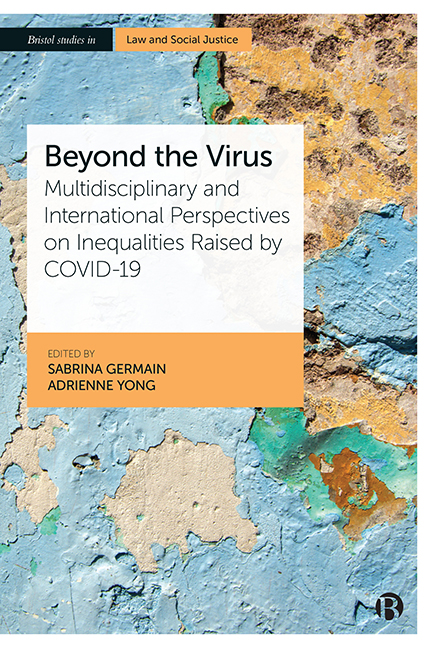 Beyond the Virus
Beyond the Virus 4 - (In)Equality, Expertise and the COVID-19 Crisis: An Intersectional Analysis
Published online by Cambridge University Press: 17 January 2024
Summary
Introduction
The COVID-19 pandemic has brought to the fore serious concerns for diverse communities in the UK: with GDP shrinking by approximately 20 per cent, the impact on people most in need is greater; unemployment rates continue to rise and there has been an excess of 2 million new claims for benefits. Moreover, research has revealed that ‘the impact of Covid-19 has replicated existing health inequalities and, in some cases, increased them’ (Public Health England, 2020c). In particular, a report commissioned by Public Health England (2020a) showed that ‘death rates from Covid-19 were higher for BAME groups when compared to White ethnic groups’. As a consequence, Public Health England urged the ‘rapid review of disparities in the risk and outcomes of Covid-19’ (Public Health England, 2020b).
This chapter considers the extent to which public discourse mirrored the intersectional effects on existing inequalities of the COVID-19 crisis. In particular, it focuses on the daily English Government Press Briefings and their tabloid press coverage to investigate the extent to which attention to and interest in inequality rose in the public agenda during the pandemic. We do so by assessing the role that government ‘experts’ played during the pandemic. We consider a range of experts: from health and police officials to MPs, who spoke during the daily English Government press briefings. Evidence-based policy in the UK has long been championed by a range of governments for a variety of issues and from all sides of the ideological spectrum (Rutter, 2012). The idea is that policymakers do not hold all the necessary information on which to base policy decision and therefore defer to experts to guide those decisions. In this vein, during the COVID-19 pandemic, the Conservative Government claimed that all its policy decisions were ‘guided by science’. We ask who the ‘expert’ were during the COVID-19 period (from 1 March 2020 to 31 March 2021), by using intersectional analysis to explore who was asked to speak during the daily English Government Press Briefings and how their public interventions were covered in the most popular tabloid print media at the time.
- Type
- Chapter
- Information
- Beyond the VirusMultidisciplinary and International Perspectives on Inequalities Raised by COVID-19, pp. 79 - 96Publisher: Bristol University PressPrint publication year: 2023


